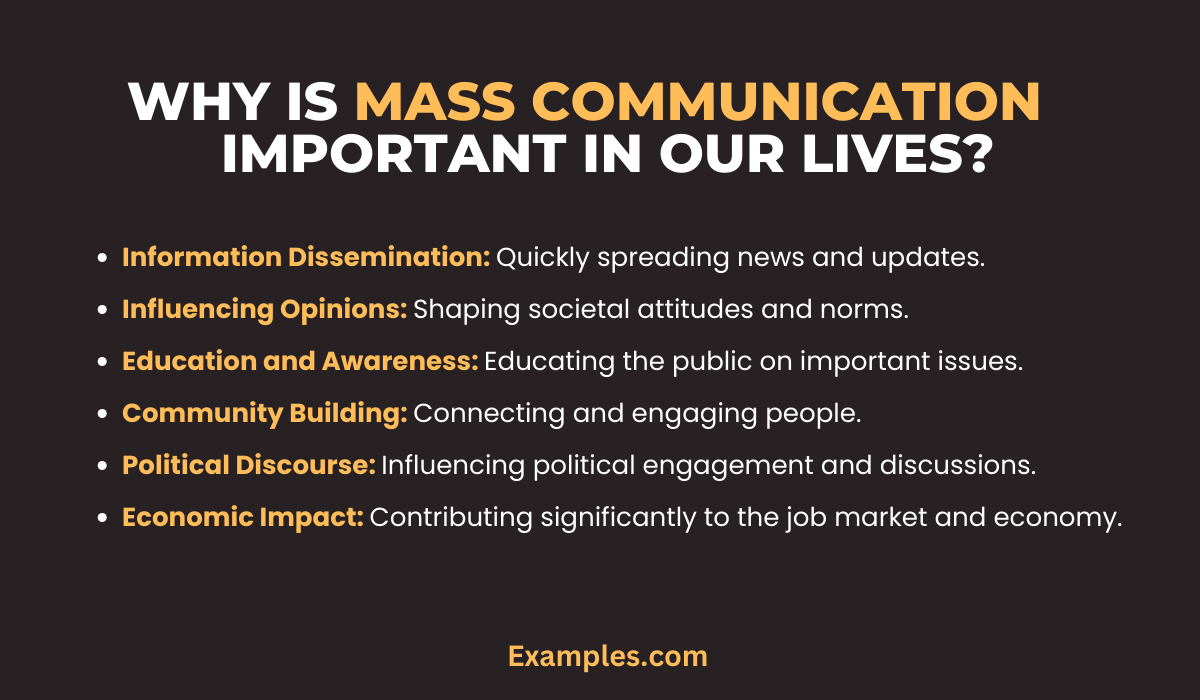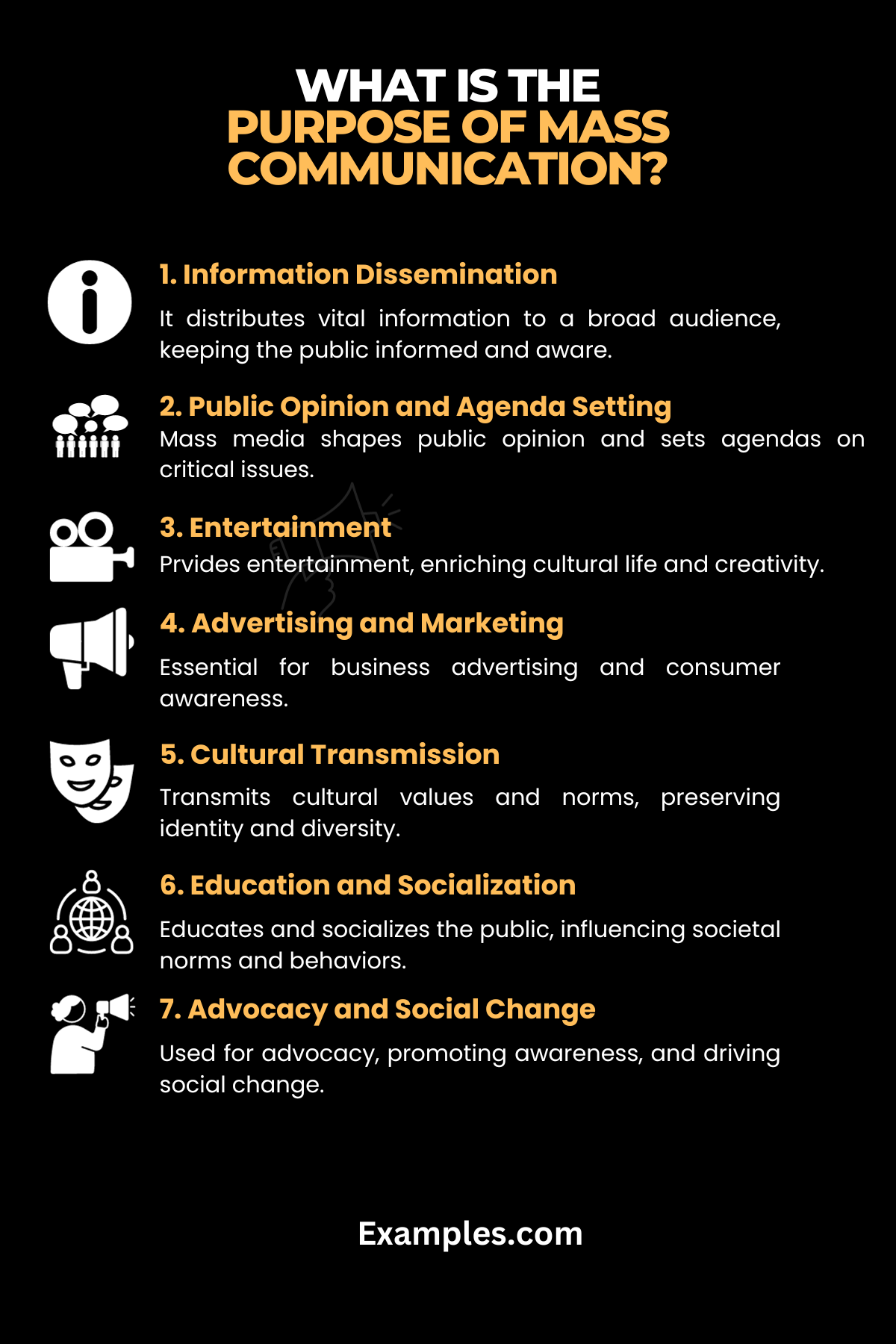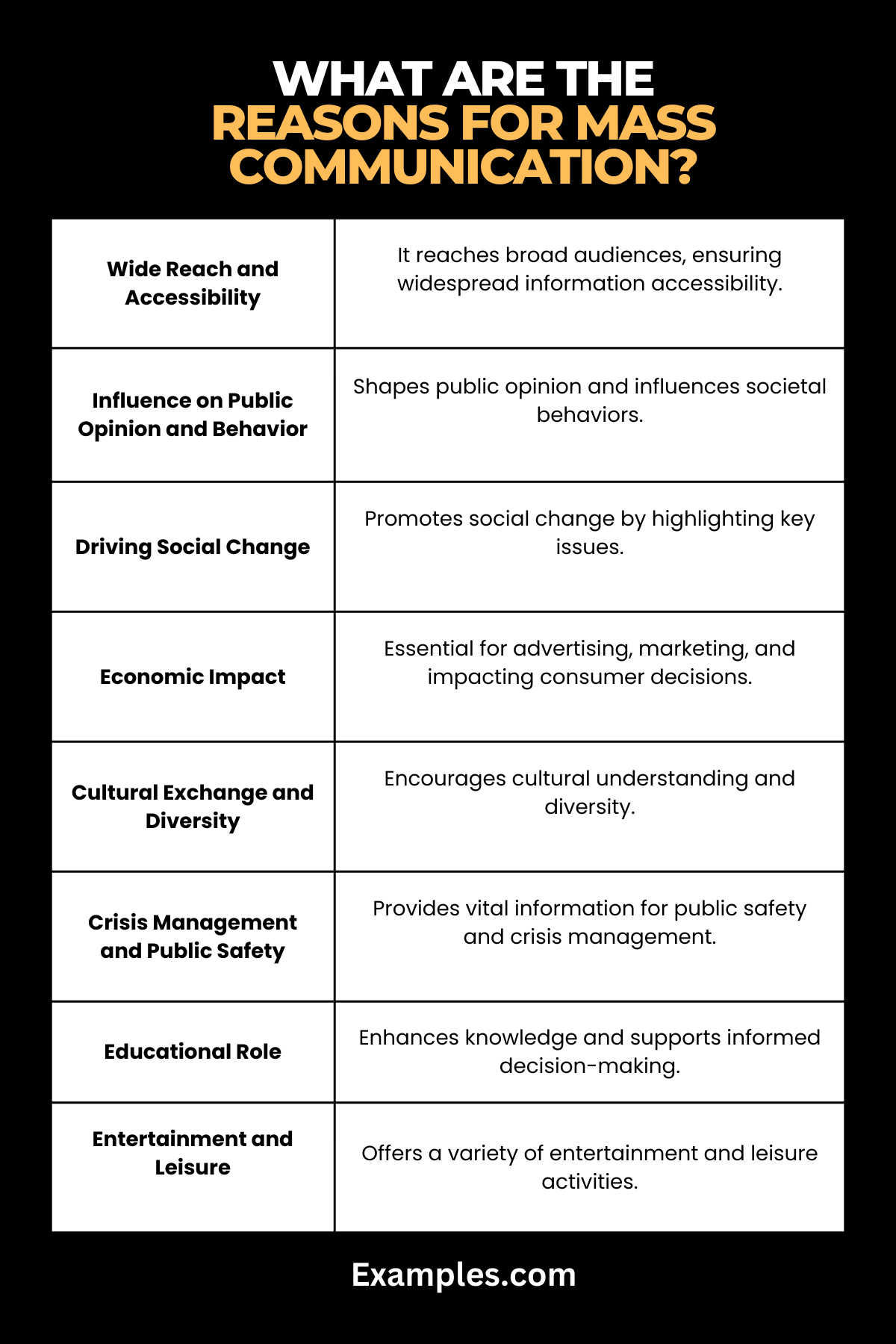Why Mass Communication is Important?
Mass communication plays a pivotal role in today’s information-driven society. It bridges gaps between people and cultures, facilitating the wide dissemination of information and ideas. Through various mediums like television, radio, and the internet, mass communication shapes public opinion, influences social norms, and fosters community engagement. In an era where information is power, the significance of mass communication cannot be overstated, as it continuously shapes our understanding of the world and our place within it.
Why is Mass Communication Important in Our Lives?
Mass communication is an essential element in the fabric of our daily lives. Its importance cannot be overstated, as it plays several critical roles in modern society.

Facilitates Widespread Information Dissemination
One of the foremost roles of mass communication is to disseminate information broadly and quickly. This ensures that a large audience, irrespective of geographical boundaries, has access to important news, updates, and educational content. This widespread dissemination of information is vital for keeping societies informed and connected.
Shapes Public Opinion and Influences Decision Making
Mass communication has a powerful impact on public opinion. Through news, documentaries, and other forms of media, it presents viewpoints and information that shape public discourse and influence individual and collective decision-making processes. This aspect of mass communication is particularly crucial in democratic societies where public opinion can affect policy and governance.
Catalyst for Social Change and Awareness
Mass media is a key driver of social change. By highlighting social issues, injustices, and global challenges, it raises awareness and can mobilize collective action towards positive change. Campaigns for social, environmental, and political causes often rely on mass communication for spreading their message and garnering support.
Economic Growth and Business Development
Mass communication is integral to the business world, especially in advertising and marketing. It enables businesses to reach a wide audience, promoting their products and services, and contributing significantly to economic growth. This function of mass communication is crucial for both large corporations and small businesses.
Promotes Cultural Diversity and Global Connectivity
Through mass communication, cultural narratives, stories, and traditions are shared across the world, promoting cultural diversity and understanding. It helps in bridging cultural gaps and fosters a sense of global connectivity and unity.
Crisis Communication and Public Safety
In times of crisis, such as natural disasters or public health emergencies, mass communication plays a vital role in disseminating critical information quickly. It guides public response and ensures the dissemination of accurate, life-saving information.
Educational and Informative Role
Beyond news and entertainment, mass communication serves an educational purpose. Educational programs, documentaries, and informative shows contribute to public knowledge and lifelong learning.
Entertainment and Quality of Life
Mass communication provides a wide array of entertainment options, contributing to leisure and quality of life. From films and music to sports and gaming, it offers numerous ways for people to relax, enjoy, and engage in cultural experiences.
What is the Purpose Of Mass Communication?
Mass communication serves several critical functions in modern society, playing a vital role in shaping public opinion, disseminating information, and influencing social dynamics. Its purposes are multifaceted and encompass various aspects of everyday life.

Information Dissemination
One of the primary purposes of mass communication is to distribute information efficiently and effectively to a large audience. This includes news about current events, educational content, public service announcements, and more. The rapid spread of information helps keep the public informed and aware of what is happening around them and across the globe.
Public Opinion and Agenda Setting
Mass communication significantly influences public opinion. Media outlets, through their coverage and focus, can shape audience perceptions and priorities. This agenda-setting role of mass communication is crucial in democracies, where public opinion can influence policy and governance.
Entertainment
Another fundamental purpose of mass communication is to provide entertainment. Television shows, movies, music, and online content cater to diverse audiences, offering leisure and relaxation. This aspect of mass communication is vital for cultural expression and creativity.
Advertising and Marketing
Mass communication is an essential tool for advertising and marketing. Businesses use media to reach potential customers, promoting products and services. This not only drives economic activity but also informs consumers about available options.
Cultural Transmission
Through mass communication, cultural values, norms, and heritage are transmitted across generations and geographical boundaries. It plays a crucial role in preserving cultural identity and promoting cultural diversity.
Education and Socialization
Mass communication is a powerful tool for education and socialization. Educational programs and documentaries broaden knowledge and understanding on various subjects. Additionally, mass media can play a role in shaping societal norms and behaviors.
Advocacy and Social Change
Mass communication is often used for advocacy and to drive social change. Campaigns on social, environmental, or political issues leverage mass media to raise awareness and mobilize public action.
Crisis Communication
In times of crisis, mass communication is essential for delivering timely and accurate information to the public. This can include emergency alerts, updates during natural disasters, or guidance during public health crises.
In conclusion, the purpose of mass communication is multifaceted, encompassing the dissemination of information, shaping public opinion, providing entertainment, and facilitating advertising, among others. Its impact on society is profound, making it a cornerstone of modern life.
What are the Reasons for Mass Communication?
Mass communication is integral to the functioning of modern society. Its significance lies in several key reasons that highlight its impact on individuals and communities.

Wide Reach and Accessibility
Mass communication has the unique ability to reach a vast audience, spanning different geographical locations and demographics. With the advancement of technology, mass media platforms like television, radio, and the internet are accessible to a large portion of the global population, ensuring that information can be disseminated widely and rapidly.
Influence on Public Opinion and Behavior
Mass communication wields significant influence over public opinion and behavior. By providing news, information, and different perspectives, it shapes how people perceive the world around them. This influence extends to various aspects of society, including politics, culture, and consumer behavior.
Driving Social Change
Mass media plays a pivotal role in advocating for and driving social change. By highlighting social issues, generating public discourse, and mobilizing action, it can lead to meaningful transformations in society.
Economic Impact
Mass communication is crucial for economic growth and development. It is instrumental in advertising and marketing, enabling businesses to reach potential customers and driving consumer decisions. This economic function of mass media contributes significantly to the global economy.
Cultural Exchange and Diversity
Mass communication facilitates cultural exchange and promotes diversity. It allows for the sharing of cultural products and ideas across borders, enriching global understanding and appreciation of different cultures.
Crisis Management and Public Safety
In times of crisis, mass communication plays a vital role in disseminating critical information quickly and effectively. This includes emergency broadcasts, public safety announcements, and health advisories, which are essential for managing crises and ensuring public safety.
Educational Role
Mass media serves an educational purpose by providing informative content, documentaries, educational programs, and news analysis. This not only enhances general knowledge but also aids in developing critical thinking and informed decision-making.
Entertainment and Leisure
Entertainment is a significant aspect of mass communication, providing people with various forms of leisure and relaxation. From movies and music to sports and gaming, mass media offers a wide array of entertainment options catering to diverse tastes and interests.
In summary, the reasons for mass communication are multifaceted, ranging from its expansive reach and influence on public opinion, to its roles in driving social change, economic development, cultural exchange, crisis management, education, and entertainment. It’s an indispensable tool in shaping and reflecting the dynamics of contemporary society.
Why is Mass Communication an Important Career?
Mass communication as a career path holds significant importance in today’s interconnected and media-driven world. It offers a range of dynamic roles and impacts various aspects of society and business.
Central Role in Information Dissemination and Public Awareness
Professionals in mass communication play a crucial role in disseminating information to the public. They are responsible for crafting and delivering news and information that keep the public informed about local, national, and global events. This role is vital in maintaining an informed society.
Influence on Public Opinion and Social Change
Mass communication careers involve shaping and influencing public opinion. Through various media forms, professionals can highlight important issues, sway public opinion, and initiate social changes. This can range from raising awareness about important social issues to influencing political discourse.
Diverse Career Opportunities
The field of mass communication offers a wide array of career opportunities. From journalism, public relations, and advertising to broadcasting, digital media, and content creation, the scope is vast and varied. This diversity allows individuals to find niches that align with their interests and skills.
Economic and Business Impact
Mass communication is integral to the business sector, particularly in marketing and advertising. Professionals in this field create strategies and content that help businesses reach their target audience, drive sales, and build brand recognition.
Global Reach and Cultural Exchange
Careers in mass communication often involve a global perspective, offering opportunities to connect with diverse cultures and audiences. This global reach fosters cultural exchange and understanding, making it a compelling career for those interested in international relations and cultural studies.
Technological Advancements and Innovation
With the rapid advancements in technology, mass communication careers are at the forefront of innovation in media and communication technologies. This presents exciting opportunities for creativity and technological engagement, keeping the field dynamic and evolving.
Potential for Personal Growth and Creativity
Mass communication allows for significant personal growth and creative expression. Whether it’s through writing, visual media, or digital content, professionals in this field have the opportunity to express their ideas and influence others.
Essential in Crisis Management
In times of crisis, mass communication professionals are essential in disseminating critical information to the public. This can range from public safety announcements to updates during emergencies, playing a key role in crisis management and response.
In conclusion, a career in mass communication is not only important but also highly rewarding. It offers a blend of influence, creativity, diversity, and technological engagement, making it an appealing and significant career choice in the modern world. Whether it’s shaping public opinion, driving social change, or contributing to the global business landscape, mass communication professionals have a profound impact on our society.
Mass communication is indispensable in our lives for its role in disseminating information rapidly, shaping public opinion, educating the masses, fostering community interaction, influencing political discourse, and driving economic growth. Its pervasive impact across various societal aspects underscores its significance in shaping an informed, connected, and dynamic world.



